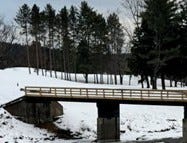Have you had any challenging conversations in 2025? You know, those ones that make you question the work you are doing as a bridge builder?
I was talking with a friend the other day. She was anxious about her husband, a federal government employee, whose position was in jeopardy, despite a long track record of glowing performance reviews. Later that day, another friend was distraught about the US leaving the Paris Climate Agreement, and the threatened rollbacks to renewable energy projects. Through tears, she shared her fears about the world her children would inherit filled with more destructive floods and wildfires.
I listened, empathized, and wanted to bring up my bridge-building work with Braver Angels and other groups, but bit my tongue. It didn’t seem like the right moment. It doesn’t seem as easy as it did a year ago. I’ve had countless friends say some version of “Beth, it’s great that you are so nice, but our country is burning down.”
This got me thinking about the intersection of dialogue and activism, a topic that was raised at a recent conversation featuring Braver Angels Senior Fellow Mónica Guzmán as part of the Dartmouth Dialogue Project. Mónica said that dialogue without activism can be like “navel gazing” – excessive self-contemplation, an intellectual exercise. Yet activism without dialogue? It’s “reckless, uninformed, and doomed to fail.”
What does it look like to be an activist and a bridge builder at the same time? Can engaging in dialogue with those we disagree with actually strengthen activism, just as activism gives meaning to bridge building?
My response — Absolutely!
Over the last six years, I have advocated for a healthy climate. Before I moved to Vermont last summer, I worked as a physician in Tennessee co-leading a volunteer legislative lobbying team, we combined activism and bridge building. We were passionate about our cause, and also knew our audience. We listened to our legislators’ concerns. We started each meeting with gratitude for the work they were doing. As highlighted in a recent Guardian article, we didn’t stop talking about climate but started talking about Climate and economic growth; Climate and public health; Climate and energy security. This approach led to the legislators supporting at least some of the bills we advocated for! On a national level, I started a Braver Angels Action Team within Citizens’ Climate Lobby (CCL) with two conservatives, Bruce Morlan and Steve Saltwick, and a liberal, Susan Adams. Together, we’ve trained more than 2000 volunteers in Braver Angels workshops.
There’s a personal benefit of bridge building, too. My work as a discussion leader, whether in climate or the New Hampshire State Legislature, also helps well-being. It helps channel agitation into composure, hostility into teamwork. I help activists move from “us vs. them” to “we, together” as we seek solutions and meaning in this brave new moment.
As Mónica said at the Dartmouth Dialogues event, “We don’t need to cross bridges, just create them.” In our forthcoming book, Beyond the Politics of Contempt- Practical Steps to Build Positive Relationships in Divided Times, I’m grateful to have the opportunity to help others build those bridges.





Your work sounds amazing and productive and very valuable at this time!
Beth - Thank you for this reflection. Your description expressed my experience with your CCL Braver Angels perfectly. CCL is unique to begin with; adding the Braver Angels approach to the climate activism of CCL is a terrific recipe. Now more than ever I am finding it helpful. Having met and worked with both conservative and liberal folks, I know that views can differ yet we can work together with hope. I need a lot of hope these days!